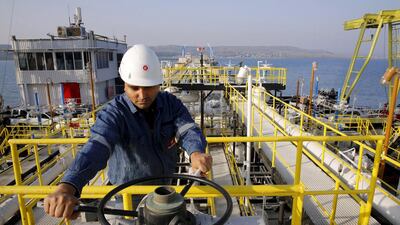Production at the Atrush oilfield development in the Kurdish region of Iraq will be delayed, possibly until next year, according to companies involved in the project, which includes Abu Dhabi’s Taqa, the field’s operator.
Talks over the financing and construction of a pipeline spur that will connect the field with the Kurdish pipeline network, to allow crude to be exported via Turkey’s Ceyhan port, have delayed production start-up, which was expected in the second quarter of this year.
The Kurdistan Regional Government (KRG) changed the proposal for the pipeline in spring this year and exercised its option to take up to 25 per cent ownership of the project.
The talks with the KRG have “unfortunately ... proved to be more complex and have taken longer than initially envisaged, but are now close to being finalised.,” said Chris Bruijnzeels, chief executive of ShaMaran Petroleum, a Canadian company which owns almost 27 per cent of Atrush.
But it has “resulted in a delay in the start of construction of the feeder pipeline [and] this will most likely result in first oil to slip into the first quarter of next year”, Mr Bruihnzeels said.
Atrush is the only major new project that Taqa is investing in since it began to severely cut back its capital expenditure two years ago.
Taqa had a capital investment target this year of Dh1.8 billion but its chief financial officer, Grant Gillon, said on Wednesday that it was likely to spend much less than that.
“We are working very closely with the KRG to ensure that the pipeline is installed and constructed before the end of the year, early next year at the latest,” said Saeed Al Dhaheri, Taqa’s acting chief operating officer.
The KRG earlier said it would take up its option to increase its ownership share at Atrush.
Taqa currently owns a little more than 53 per cent, ShaMaran almost 27 per cent and Marathon Oil the remainder.
KRG can take up to 25 per cent, reducing Taqa’s stake to just below 40 per cent and the other partners pro rata.
The field is expected to ramp up to peak gross production of 30,000 barrels per day.
amcauley@thenational.ae
Follow The National's Business section on Twitter

